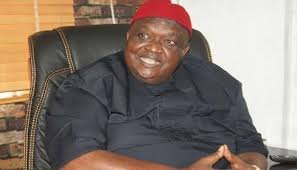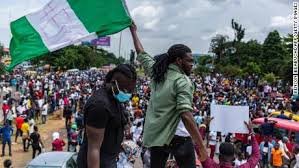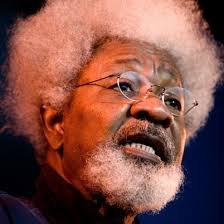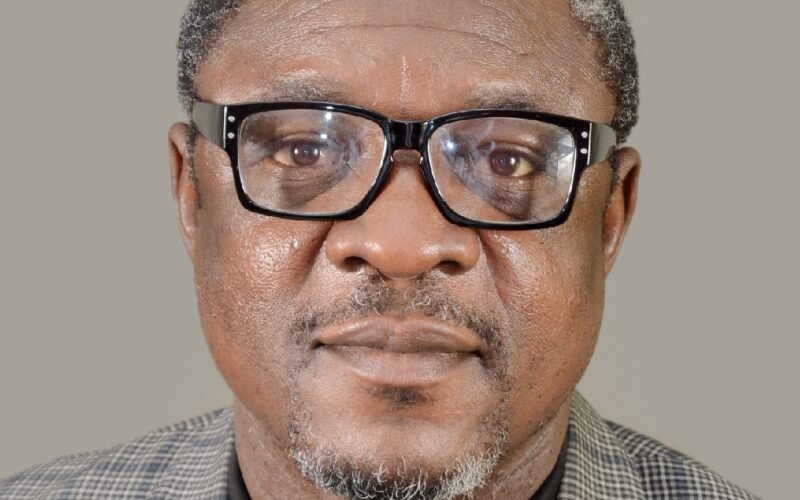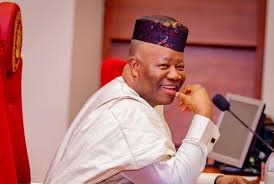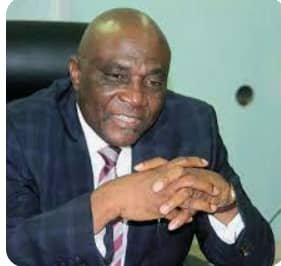By SHEDDY OZOENE
Just before 4pm on Thursday, November 3, 2022, the voice of Ugochukwu Chime reverberated across the expansive Michael Okpara Square, Enugu, interrupting the forty-something dance and masquerade groups that were performing simultaneously at their various stands. As Chairman of the Planning Committee of Agbaja Peoples Summit 2022, it was his duty to render the vote of thanks and appreciate individuals, groups and communities that came to celebrate with Agbaja people on their very first Cultural Carnival.
His speech drew the curtains on the very successful Carnival which was attended by Enugu State Governor, Rt. Hon. Ifeanyi Ugwuanyi as well as his predecessor in office, Sullivan Chime, the State’s Deputy Governor, Lolo Cecilia Ezeilo, the former Minister of Power, Prof. Chinedu Nebo as well as traditional rulers from most communities in Agbaja land.
The 2-day Agbaja Peoples Summit that took all of five months to plan and which had started the previous day with an Economic Summit at the Amadeo Conference Centre, Enugu, had finally come to a grand finale. It was a big relief to the organizers who endured immense pressure in the preceding weeks to deliver the event.
In June 2022, when the Agbaja Leaders of Thought broached the idea of a Summit, most of us were initially reluctant. It seemed impossible. Even Prof. Ike Oluka, who had to call to encourage some of us to take up the appointment, did not sound convincing. Such a thing has never happened in recent memory and it seemed like a tall order to ask us to reconvene Agbaja people that have now found themselves in as many as five different local government areas of Enugu State.
The list of 19 initial members of the Committee Prof. Oluka sent to me on June 17 was an impressive assemblage, no doubt, but it was nowhere near the number required to drive the project of that nature. The BOT said we could add whoever would be useful, so we accepted the assignment and tried to build something, literally, from nothing.
We started by embarking on a recruitment drive, reaching out to our kinsmen at home and in the Diaspora. The response was encouraging as everyone, from Nigeria to Europe and North America, bought into the idea of reawakening the Agbaja consciousness. They all expressed the sentiment that the establishment of a common platform for the Agbaja kingdom was long overdue.
Our very first meeting, a virtual one, took place 8pm Nigerian time on Sunday, June 26, 2022. It was followed by 5 other Zoom meetings involving those in Nigeria and the Diaspora. And for five straight weeks thereafter, 8pm Nigerian time became our Sunday evening routine. To hold such meetings at that period across time zones meant we were disrupting some people’s normal schedules, especially in USA and Canada; no one complained as we were all prepared to make sacrifices.
The search for Agbaja unity was worthwhile, after all. Every passing day, the vision of a successful Summit became clearer, just like the hope of a great tomorrow for Agbaja and her people, continued to grow.
As our focus became sharper, the scope of the Summit got wider, so much that the earlier scheduled date, August 26 and 27 was first shifted to October and finally to November 2 and 3, 2022. Udi Local Government headquarters, which Oluka had initially mooted as venue, was jettisoned for Okpara Square. The reason is simple: if indeed Agbaja is Enugu and Enugu is Agbaja, then we needed to start possessing our possession, in a manner of speaking.
We also determined that the Summit would stand on three legs: the economic advancement of Agbaja people, the deliberate actions that will cement our unity and the revival of our cultural heritage. We were also determined to keep partisan politics out of it all, regardless of the fact that the Summit would happen in the thick of political campaigns.
It was over a month of continuous virtual meetings before we commenced physical meetings in Enugu. From a handful of attendees, we grew in number so much that we shifted from the small but comfy meeting rooms in Roots Restaurant in Independence Layout, to the corporate headquarters of our Planning Committee Chairman’s COPEN Group.
From a virtual secretariat, we commandeered a section of Frank Maluze’s office on Upper Chime, New Haven to serve as Secretariat. With time, the ten Committees we set up to handle specific areas of the assignment had to be constantly expanded as requests flooded in from people who wanted to be included. The day we decided to open a dedicated bank account and call for donations, Hon. Chime Orji responded in a matter of hours and opened the floodgates to financial support from around and afar.
It was not until September that we had the audacity to formally announce the Summit to the public. In a statement issued by the Chairman BoT, Prof. Chinedu Nebo, he explained the objective of the event, saying the gathering will provide a platform to foster unity and rekindle the bonds of kinship among the various communities that make up Agbaja. He solicited support from Agbaja people towards realizing the lofty objectives of the summit, adding that the event will be a defining moment in Agbaja history.
Two weeks later we went on a courtesy visit to His Excellency the Governor of Enugu State, Rt. Hon. Ifeanyi Ugwuanyi. Prof Nebo who led the 7-member team, told the governor that the Summit would be a vehicle for unity, progress and socio-cultural advancement of Agbaja people.
He said Agbaja people were proud of their past leaders who spearheaded the creation of Enugu State and the advancement of Wawa people. “Over the past few decades, however, we have been working hard to sustain those legacies and build on them for the wellbeing of Agbaja people”. He reeled out a long list of past leaders who he said bequeathed the present generation a legacy of leadership, public service, industry and a rich culture, adding that Agbaja people have reunited to seek a common cause and build on those legacies.
Governor Ugwuanyi who was impressed with the objectives of the Summit, endorsed the project and pledged the state government’s support. According to him, Agbaja Summit would be leading the effort in involving the private sector in the development of our rural areas.
The State’s Deputy Governor Lolo Cecilia Ezeilo also threw her weight behind the project while the Chairman of Udi Local Government Area, Phillip Oko and his counterpart from Ezeagu Local Government Area, Chukwudi Ozoelouba as well as the Deputy Chairman of Enugu North Local Government Area, Chris Ani followed suit by attending the expanded meeting of the Planning committee in Enugu. They never looked back in supporting the project morally and financially till the end.
Delivering the 2-day event was challenging: apart from funds that were not enough, the logistical requirements was huge. The Investment Summit anchored by Dr. Emeka Ene, for instance, was designed to meet global standards, complete with exhibition booths. We needed the captains of industry and major investment partners in Nigeria to be part of it. As a hybrid event, a mentoring programme for the youth was supposed to take place simultaneously. Our people in the Diaspora wanted every bit of it live-streamed so they could follow the proceedings. We delivered them all.
The platform was used to honour Nigerian Breweries Plc, the largest brewery in West Africa that operates in Agbaja land and Phinomar Limited, the indigenous agricultural conglomerate owned by Igwe IOU Ayalogu of Ngwo. More significantly, it was used to honour the immediate past governor of Enugu State, Sullivan Iheanacho Chime for his administration’s impactful renewal of infrastructure across the state.
The significance of the award to Governor Chime is not lost on people of the state: very few public servants are so recognized by their own kinsmen after they leave office.
The Cultural Carnival was supposed to be easier but it was not. Our Contact Committee headed by Frank Maluze and Ricky Agu had to work overtime reaching individuals and special groups. The Committee on Community and Cultural Mobilization led by Hon. Charles Nwokike and Ozo Ferdinand Anikwe traversed the communities to meet our political leaders and traditional rulers as well as sensitize the people. Our youths led by Ebube Nebo did the yeoman’s job of driving the message deeper to the rural populace. They did much of the leg work, distributing leaflets in motor parks and our local markets.
When the airwaves came alive with explanatory news commentaries, they helped clear doubts in the minds of some people on why the Summit was holding. They energized our preparation and helped explain where we’re coming from and what our objectives are. In all, nearly a hundred of such commentaries, jingles and mobilization messages were relayed on air, courtesy of our sponsors, Chief Matthew Obodoechi, Chief Eric Chime and Ada Owa, Mrs. Uzoamaka Obiajunwa of Royalton Hotels Abuja.
The magazine, NzukoAGBAJA was conceived as a vehicle to document the high points of the Summit. It ended up as a rallying point of support from our Agbaja people, their friends and well wishers. As many as 35 companies, individuals and politicians across party lines paid handsomely to advertise their messages of solidarity with Ndi Agbaja. We were initially reluctant to accept messages from political party candidates but we budged when the few that came from Peter Mbah, Osita Ngwu, Festus Uzor, Uche Ugwu and Chima Obieze of PDP as well as Frank Nweke, jnr, and Ndubuisi Enechi Onyia of APGA did not carry explicit campaign messages.
It was painful that we could not accommodate the message from Chief Offor Chukwuegbo who represents Enugu North and South in the Federal House of Representatives because it arrived late. With Senator Ike Ekweremadu unavailable, Offor was the only representative of any section of Agbaja land in the National Assembly that showed up in solidarity with Agbaja people.
The 2-day Summit started Wednesday, November 2, 2022 with an Investment Summit which identified the development potentials in Agbaja land and produced a blueprint for harnessing them for the benefit of the people. It was rounded off with a well-attended dinner sponsored by the Deputy Governor of Enugu State, Lolo Cecilia Ezeilo. With the Cultural Carnival on the second day, the Summit came to a roaring end.
It was a successful event but it did not go without major challenges, especially in funding, planning and mobilization. There were also shortfalls in our expectations: it is not acceptable, for instance, that only about 80% of our communities attended the Cultural Carnival. We did not feature the wrestling match that was expected to be a major attraction. And the display of our local cuisines and indigenous crafts like blacksmithing was not given prominence. There are others.
There were minor distractions here and there and one futile effort by one Dennis Amadi to sabotage the Summit outright. For someone who should be a symbol of unity, he tried unsuccessfully to draw imaginary boundaries between what he termed ‘core Agbaja’ and fringe Agbaja. At a time others were building bridges of peace and unity, he was busy building walls of hate and stoking the fire of discord among the people he purports to lead. In any case he failed spectacularly to stop an idea whose time has come.
The challenge before us is in sustaining the Summit. The 2022 Summit succeeded mainly because of its exemplary leadership and the uncommon dedication of members of the Planning Committee. A project like that rises or falls on leadership and Ugochukwu Chime who headed our team, proved he had vision and the grit to drive it.
Going forward, however, the Agbaja Leaders of Thought should take deliberate actions to create a wider platform that will sustain the new Agbaja union. It should start by transforming itself from the perceived elitist composition (nearly half of the 14-member BOT are academic professors) to something more egalitarian. It should also respond to the republican nature of Igbo people by being somehow representative with regular scheduled physical meetings. Thirdly we should set up Nzuko Agbaja structures by either embedding it within existing town unions in our communities or setting up our own structures on the basis of clans that make up Agbaja.
Our coming together has ramifications for the economic, socio-cultural and political advancement of our people. The successes recorded are only the building blocks for the Agbaja of our dream. Now that the drums have gone silent, we must see ourselves as being at the end of a new beginning.
Sheddy Ozoene is Secretary of the Planning Committee for Agbaja Peoples Summit 2022.


